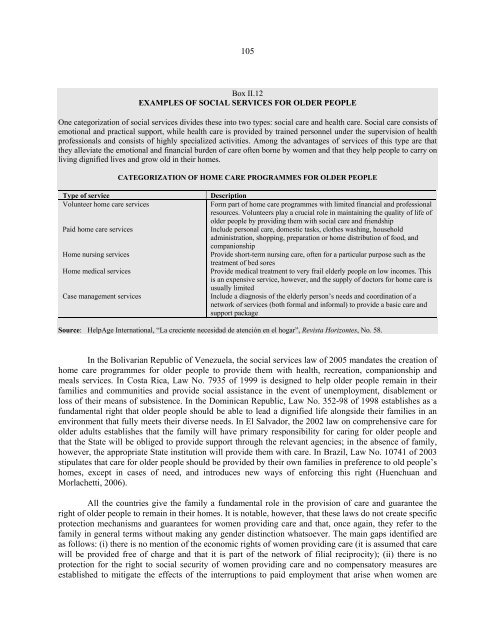Women in Latin America and the Caribbean - Cepal
Women in Latin America and the Caribbean - Cepal
Women in Latin America and the Caribbean - Cepal
Create successful ePaper yourself
Turn your PDF publications into a flip-book with our unique Google optimized e-Paper software.
105<br />
Box II.12<br />
EXAMPLES OF SOCIAL SERVICES FOR OLDER PEOPLE<br />
One categorization of social services divides <strong>the</strong>se <strong>in</strong>to two types: social care <strong>and</strong> health care. Social care consists of<br />
emotional <strong>and</strong> practical support, while health care is provided by tra<strong>in</strong>ed personnel under <strong>the</strong> supervision of health<br />
professionals <strong>and</strong> consists of highly specialized activities. Among <strong>the</strong> advantages of services of this type are that<br />
<strong>the</strong>y alleviate <strong>the</strong> emotional <strong>and</strong> f<strong>in</strong>ancial burden of care often borne by women <strong>and</strong> that <strong>the</strong>y help people to carry on<br />
liv<strong>in</strong>g dignified lives <strong>and</strong> grow old <strong>in</strong> <strong>the</strong>ir homes.<br />
CATEGORIZATION OF HOME CARE PROGRAMMES FOR OLDER PEOPLE<br />
Type of service<br />
Volunteer home care services<br />
Paid home care services<br />
Home nurs<strong>in</strong>g services<br />
Home medical services<br />
Case management services<br />
Description<br />
Form part of home care programmes with limited f<strong>in</strong>ancial <strong>and</strong> professional<br />
resources. Volunteers play a crucial role <strong>in</strong> ma<strong>in</strong>ta<strong>in</strong><strong>in</strong>g <strong>the</strong> quality of life of<br />
older people by provid<strong>in</strong>g <strong>the</strong>m with social care <strong>and</strong> friendship<br />
Include personal care, domestic tasks, clo<strong>the</strong>s wash<strong>in</strong>g, household<br />
adm<strong>in</strong>istration, shopp<strong>in</strong>g, preparation or home distribution of food, <strong>and</strong><br />
companionship<br />
Provide short-term nurs<strong>in</strong>g care, often for a particular purpose such as <strong>the</strong><br />
treatment of bed sores<br />
Provide medical treatment to very frail elderly people on low <strong>in</strong>comes. This<br />
is an expensive service, however, <strong>and</strong> <strong>the</strong> supply of doctors for home care is<br />
usually limited<br />
Include a diagnosis of <strong>the</strong> elderly person’s needs <strong>and</strong> coord<strong>in</strong>ation of a<br />
network of services (both formal <strong>and</strong> <strong>in</strong>formal) to provide a basic care <strong>and</strong><br />
support package<br />
Source: HelpAge International, “La creciente necesidad de atención en el hogar”, Revista Horizontes, No. 58.<br />
In <strong>the</strong> Bolivarian Republic of Venezuela, <strong>the</strong> social services law of 2005 m<strong>and</strong>ates <strong>the</strong> creation of<br />
home care programmes for older people to provide <strong>the</strong>m with health, recreation, companionship <strong>and</strong><br />
meals services. In Costa Rica, Law No. 7935 of 1999 is designed to help older people rema<strong>in</strong> <strong>in</strong> <strong>the</strong>ir<br />
families <strong>and</strong> communities <strong>and</strong> provide social assistance <strong>in</strong> <strong>the</strong> event of unemployment, disablement or<br />
loss of <strong>the</strong>ir means of subsistence. In <strong>the</strong> Dom<strong>in</strong>ican Republic, Law No. 352-98 of 1998 establishes as a<br />
fundamental right that older people should be able to lead a dignified life alongside <strong>the</strong>ir families <strong>in</strong> an<br />
environment that fully meets <strong>the</strong>ir diverse needs. In El Salvador, <strong>the</strong> 2002 law on comprehensive care for<br />
older adults establishes that <strong>the</strong> family will have primary responsibility for car<strong>in</strong>g for older people <strong>and</strong><br />
that <strong>the</strong> State will be obliged to provide support through <strong>the</strong> relevant agencies; <strong>in</strong> <strong>the</strong> absence of family,<br />
however, <strong>the</strong> appropriate State <strong>in</strong>stitution will provide <strong>the</strong>m with care. In Brazil, Law No. 10741 of 2003<br />
stipulates that care for older people should be provided by <strong>the</strong>ir own families <strong>in</strong> preference to old people’s<br />
homes, except <strong>in</strong> cases of need, <strong>and</strong> <strong>in</strong>troduces new ways of enforc<strong>in</strong>g this right (Huenchuan <strong>and</strong><br />
Morlachetti, 2006).<br />
All <strong>the</strong> countries give <strong>the</strong> family a fundamental role <strong>in</strong> <strong>the</strong> provision of care <strong>and</strong> guarantee <strong>the</strong><br />
right of older people to rema<strong>in</strong> <strong>in</strong> <strong>the</strong>ir homes. It is notable, however, that <strong>the</strong>se laws do not create specific<br />
protection mechanisms <strong>and</strong> guarantees for women provid<strong>in</strong>g care <strong>and</strong> that, once aga<strong>in</strong>, <strong>the</strong>y refer to <strong>the</strong><br />
family <strong>in</strong> general terms without mak<strong>in</strong>g any gender dist<strong>in</strong>ction whatsoever. The ma<strong>in</strong> gaps identified are<br />
as follows: (i) <strong>the</strong>re is no mention of <strong>the</strong> economic rights of women provid<strong>in</strong>g care (it is assumed that care<br />
will be provided free of charge <strong>and</strong> that it is part of <strong>the</strong> network of filial reciprocity); (ii) <strong>the</strong>re is no<br />
protection for <strong>the</strong> right to social security of women provid<strong>in</strong>g care <strong>and</strong> no compensatory measures are<br />
established to mitigate <strong>the</strong> effects of <strong>the</strong> <strong>in</strong>terruptions to paid employment that arise when women are











